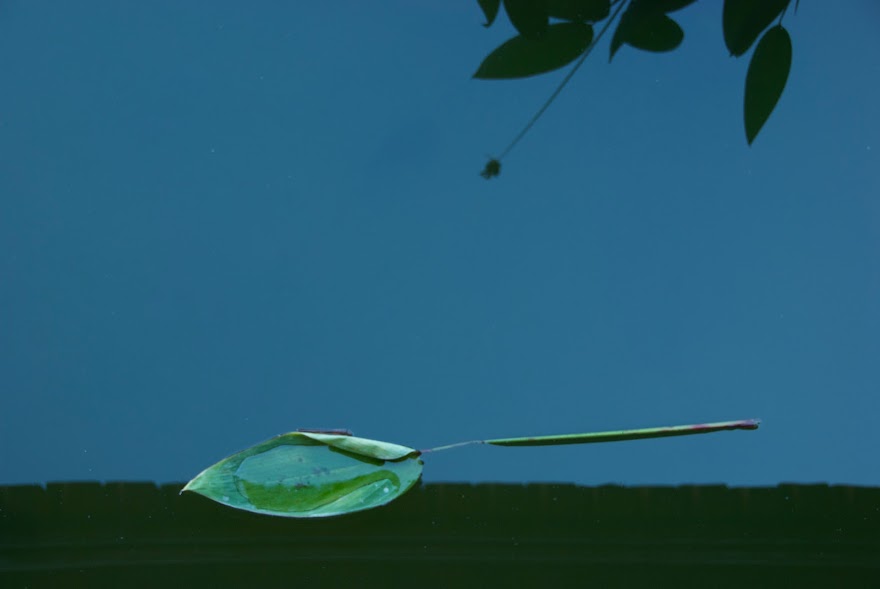Photo by Nico Martinez via Sailing Anarchy.
Christmas 1974
THERE seems to be a regulation that I spend holidays repairing the mainsail: first Thanksgiving; now Christmas. The sun is shining and the storm is blowing itself out, but there is still enough wind so that we sailed at 5 knots under bare poles while I worked away this morning with needle and thread.
At dawn the fitting broke which holds one of the blocks through which the line passes from the self-steering vane to the tiller. The violence of the resulting accidental jibe left a four foot tear in the mainsail and broke the upper batten. Replacing the shackles along the luff with ties in Papeete proved invaluable. If the sail had not come down smoothly, the damage would have been much worse.
I am not entirely satisfied with the patch I put on, but after sewing for five hours, I declared a holiday.
We have lost a winch handle and the top slat of the three which served to close the companionway. I saw them being carried overboard by a wave which broke on deck while I was wrestling with the mainsail, but had enough trouble preventing myself from being swept away and could not reach them in time. I have two more winch handles and have fitted a half-inch thick piece of Plexiglas I had cut to cover the companionway in heavy weather. Business as usual.
Christmas 1975
THIS extreme South Atlantic is a miserable place. I can never before remember experiencing such a prolonged unpleasant sail, and it has not been due to great storms. Often I have wished for the wind to be stronger rather than weaker, and always I have wished for it to be more constant. Misery has come from the persistent fog, the daily freezing rain, the featureless grey gloom.
Christmas Day 1975 finds us as nearly in the middle of that gloom as possible—49°South 25°West. Surprisingly, I was able to get a sun sight, before my regular morning bail.
Bailing has become a methodical routine. Dip the bucket into the bilge, one step up the companionway ladder, balance there waiting for the roll of the boat, then up and over the side with the water and back down for another bucketful. A gallon of water weighs about 8.2 pounds, and bucketful by bucketful, I lift and return to the sea more than a ton of its contents each day.
My hands continue to be red and raw, but with the somewhat warmer temperature—I would estimate most days are now in the low 40° Fahrenheit range—the painful tingling has gone, as it has from my feet, although I continue to walk in place several hundred steps each day to improve my circulation.
Several people gave me small presents to open: a tin of cookies, a photograph, some books, and a bookmark. I made immediate use of the cookies, one of the books and the bookmark before attempting to prepare my Christmas dinner.
In the late afternoon, wearing the same clothes that I had worn for more days and nights than I cared to recall—that in fact I could recall, although had someone been with me I suspect they would have gladly recalled for me—I began working on the ever-more-recalcitrant stove. After almost a full hour, it finally condescended to light.
The menu consisted of chicken, rice, almonds, cranberry sauce, carrots, and plum pudding. Naturally, all were served with appropriate flourishes by the doting steward.
“Some vintage port with dinner, sir?”
“Yes. That will be fine, James.”
“And afterwards, a liqueur?”
“Well . . .”
“Grand Marnier would seem appropriate; after all, who deserves it more?” “A taste, perhaps.”
Because it is a holiday, I actually did consider trying to eat off a plate. But we were rolling so much that a plate would never have stayed on the table, or food on the plate, so I wedged myself as always in a corner of the galley and ate standing there from the various pots in which the food had been cooked.
Naturally, my thoughts return to those I have left behind, but they are very distant. Months of solitude, six time zones, and almost 10,000 sea miles separate us. I know they think of me, but they do not even know if I am still alive. I have sailed from the land completely.
And my thoughts reach forward in a continuance of the premonition that there is someone unknown before me. I try to picture her, but I cannot. I do not know if she is in Cape Town, or perhaps Australia or New Zealand. What is she doing at this very moment? It is futile. I cannot possibly imagine.
As the day’s grayness becomes night’s blackness, I go to bed and lie there listening to the radio. A little more than a year ago, I heard “White Christmas” being sung in French in Papeete. Tonight I hear Christmas carols and parts of Handel’s Messiah from the BBC, Voice of America, Radio South Africa, and various stations in Argentina and Brazil that I cannot identify.
I also catch bits of newscasts, and without repeating the all-too-familiar and all-too-dreary details, it does not seem that the carols, the violence, and my solitary, silent life have anything in common. How odd that truly they are all one.
Christmas never seemed very important to me when I lived ashore. Yet here the day seems special in this barren ocean. Nothing spectacular happened—for which I am grateful because something spectacular out here usually means something disastrous—yet because of Christmas, I feel closer to those I care for, closer to mankind. I am not lonely or homesick—home has become wherever Egregious is—I am living the great adventure of my life; but on Christmas Day 1975, as I go to sleep thousands of miles alone at sea, I wish that all men could know the peace that enfolds me as Egregious races east into the night.

